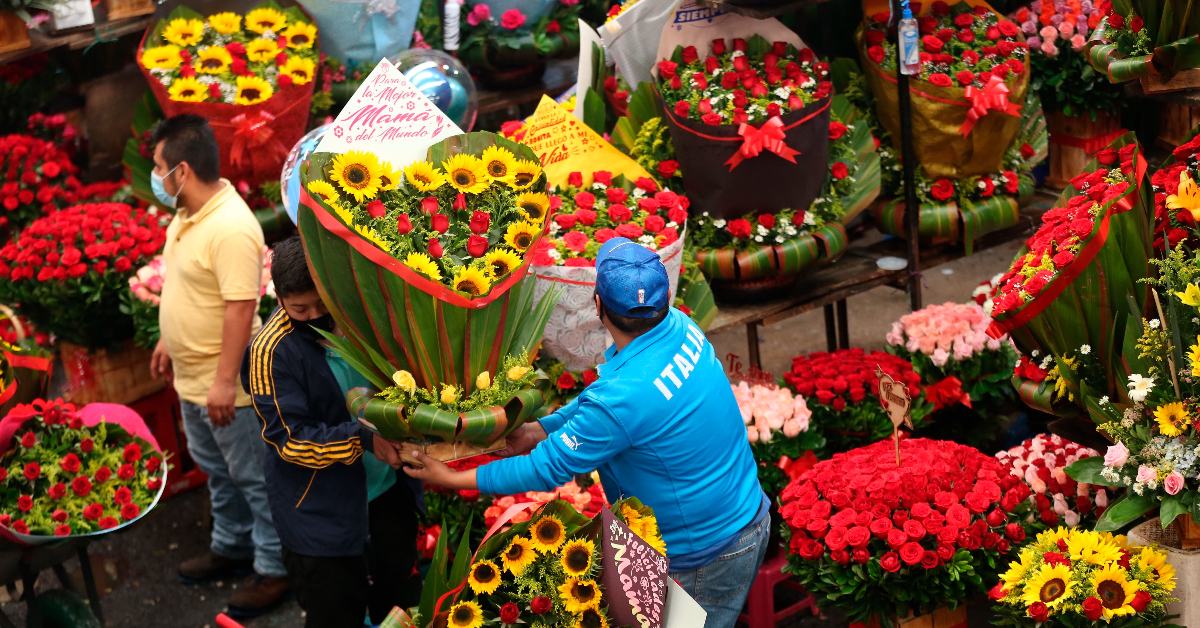Puerto Vallarta (PVDN) - Mother's Day, known as "Día de las Madres," is a deeply cherished occasion in Mexico, celebrated annually on May 10th . . .
CONTINUE READING THIS NEWS ARTICLE BY BECOMING A PVDN SUBSCRIBER!
>> SUBSCRIBE TO OUR NEWS ON WHATSAPP CHANNELS HERE (FROM YOUR CELL PHONE!)<<
Popular posts:
 Citizens of Puerto Vallarta Still Feel Safe Putting The City in Seventh Place in the Country Puerto Vallarta, Jalisco, continues to shine as one of Mexico's safest cities, securing its position among the nation's top 10 cities where citizens feel most secure, according to the latest National Urban Public Safety Survey (ENSU) conducted by INEGI. The survey, which evaluates citizen perceptions of safety, covers the first quarter of the year and…
Citizens of Puerto Vallarta Still Feel Safe Putting The City in Seventh Place in the Country Puerto Vallarta, Jalisco, continues to shine as one of Mexico's safest cities, securing its position among the nation's top 10 cities where citizens feel most secure, according to the latest National Urban Public Safety Survey (ENSU) conducted by INEGI. The survey, which evaluates citizen perceptions of safety, covers the first quarter of the year and… Unchecked Growth of Platforms Like Airbnb is Ruining Puerto Vallarta Puerto Vallarta, Mexico - In Puerto Vallarta, the proliferation of digital lodging platforms, notably Airbnb, has sparked a surge in real estate development over the past decade, particularly in central areas of the municipality. This trend, as highlighted by Alfonso Baños, a researcher and doctor in City, Territory, and Sustainability at the University of Guadalajara…
Unchecked Growth of Platforms Like Airbnb is Ruining Puerto Vallarta Puerto Vallarta, Mexico - In Puerto Vallarta, the proliferation of digital lodging platforms, notably Airbnb, has sparked a surge in real estate development over the past decade, particularly in central areas of the municipality. This trend, as highlighted by Alfonso Baños, a researcher and doctor in City, Territory, and Sustainability at the University of Guadalajara… Increase in Extortion Attempts Rattles Puerto Vallarta’s Business Sector Puerto Vallarta, Mexico - In recent weeks, Puerto Vallarta's business community has been shaken by a surge in extortion attempts, with between 12 and 16 cases reported in just the last two weeks alone. This concerning trend was highlighted by the newly appointed president of the Business Coordinating Council (CCE), Juan Pablo Martínez Torres, who…
Increase in Extortion Attempts Rattles Puerto Vallarta’s Business Sector Puerto Vallarta, Mexico - In recent weeks, Puerto Vallarta's business community has been shaken by a surge in extortion attempts, with between 12 and 16 cases reported in just the last two weeks alone. This concerning trend was highlighted by the newly appointed president of the Business Coordinating Council (CCE), Juan Pablo Martínez Torres, who… Puerto Vallarta Gears Up for the 2024 Marathon Puerto Vallarta is abuzz with anticipation as it braces to host the fifth edition of its renowned Marathon, slated to kick off on April 21. This eagerly awaited sporting spectacle has firmly entrenched itself as a highlight on the global athletic calendar, drawing participants from diverse corners of the world. The 2024 Puerto Vallarta Marathon…
Puerto Vallarta Gears Up for the 2024 Marathon Puerto Vallarta is abuzz with anticipation as it braces to host the fifth edition of its renowned Marathon, slated to kick off on April 21. This eagerly awaited sporting spectacle has firmly entrenched itself as a highlight on the global athletic calendar, drawing participants from diverse corners of the world. The 2024 Puerto Vallarta Marathon… FAKE NEWS ALERT: American Reported Missing in Puerto Vallarta Found After Four Hours, Not Four Years Recent false claims circulating online regarding an alleged four-year disappearance of an American in the jungles of Puerto Vallarta have been debunked. The individual was actually reported missing on April 9 and found a mere four hours later, highlighting the swift and efficient response of local authorities in safeguarding the community. This incident underscores the…
FAKE NEWS ALERT: American Reported Missing in Puerto Vallarta Found After Four Hours, Not Four Years Recent false claims circulating online regarding an alleged four-year disappearance of an American in the jungles of Puerto Vallarta have been debunked. The individual was actually reported missing on April 9 and found a mere four hours later, highlighting the swift and efficient response of local authorities in safeguarding the community. This incident underscores the… Puerto Vallarta Welcomes Record-Breaking Cruise Visitors, Boosting Local Economy Puerto Vallarta, Mexico - Puerto Vallarta, known as the "green pearl of the Mexican Pacific," has marked an impressive start to the year, welcoming a staggering 177,000 passengers aboard 58 cruise ships during the first quarter. These figures, revealed by the Administration of the National Port System (ASIPONA), reflect a substantial economic injection of 21…
Puerto Vallarta Welcomes Record-Breaking Cruise Visitors, Boosting Local Economy Puerto Vallarta, Mexico - Puerto Vallarta, known as the "green pearl of the Mexican Pacific," has marked an impressive start to the year, welcoming a staggering 177,000 passengers aboard 58 cruise ships during the first quarter. These figures, revealed by the Administration of the National Port System (ASIPONA), reflect a substantial economic injection of 21… New Direct Flight from Prague to Puerto Vallarta Announced for Autumn-Winter Season In a move set to bolster international tourism to Puerto Vallarta, Jalisco, a new direct flight route from Europe has been unveiled, marking a significant expansion in the city's air connectivity. Beginning in October of this year and continuing through April 2025, travelers from the heart of Europe will have the opportunity to embark on…
New Direct Flight from Prague to Puerto Vallarta Announced for Autumn-Winter Season In a move set to bolster international tourism to Puerto Vallarta, Jalisco, a new direct flight route from Europe has been unveiled, marking a significant expansion in the city's air connectivity. Beginning in October of this year and continuing through April 2025, travelers from the heart of Europe will have the opportunity to embark on… LGBTQ+ Travelers Contribute 40% of Puerto Vallarta’s Tourism Revenue Puerto Vallarta, Mexico - In a significant milestone for Puerto Vallarta, Jalisco, the influence of LGBT+ tourism on the city's economy soared to unprecedented heights in 2023. According to recent data released by Luis Antonio Villaseñor, the general director of the Puerto Vallarta Tourism Trust, the sector welcomed a record-breaking 2 million visitors, injecting a…
LGBTQ+ Travelers Contribute 40% of Puerto Vallarta’s Tourism Revenue Puerto Vallarta, Mexico - In a significant milestone for Puerto Vallarta, Jalisco, the influence of LGBT+ tourism on the city's economy soared to unprecedented heights in 2023. According to recent data released by Luis Antonio Villaseñor, the general director of the Puerto Vallarta Tourism Trust, the sector welcomed a record-breaking 2 million visitors, injecting a… Municipal Police Officers Linked to Abuse of Authority Case in Puerto Vallarta Puerto Vallarta, Mexico - Two municipal police officers in Puerto Vallarta, identified as Nadia Araceli Esmeralda “N” and José Aldo “N”, have been formally linked to a legal process for the crime of abuse of authority. The decision came from Susana Azzaid Betancourt Flores, Control and Oral Judge of the Eighth District, based in Puerto…
Municipal Police Officers Linked to Abuse of Authority Case in Puerto Vallarta Puerto Vallarta, Mexico - Two municipal police officers in Puerto Vallarta, identified as Nadia Araceli Esmeralda “N” and José Aldo “N”, have been formally linked to a legal process for the crime of abuse of authority. The decision came from Susana Azzaid Betancourt Flores, Control and Oral Judge of the Eighth District, based in Puerto… Annual US Human Rights Report Denounces Mexico’s Impunity and Persistent Violence Puerto Vallarta, Mexico - In its latest Annual Human Rights Report, the United States Department of State has condemned Mexico for its failure to investigate and prosecute the majority of criminal cases, including homicides, torture, kidnappings, human trafficking, and extortion. The report, released recently, also underscored that the level of violence within the country remains…
Annual US Human Rights Report Denounces Mexico’s Impunity and Persistent Violence Puerto Vallarta, Mexico - In its latest Annual Human Rights Report, the United States Department of State has condemned Mexico for its failure to investigate and prosecute the majority of criminal cases, including homicides, torture, kidnappings, human trafficking, and extortion. The report, released recently, also underscored that the level of violence within the country remains…


